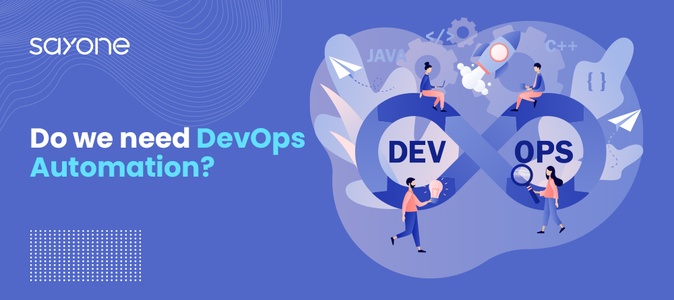8 Best DevOps Automation Tools in 2023

Share This Article
Do we need DevOps automation?
Table of Contents
Subscribe to Our Blog
We're committed to your privacy. SayOne uses the information you provide to us to contact you about our relevant content, products, and services. check out our privacy policy.
What is DevOps Automation?
DevOps Automation is using technology to automate development and IT operations tasks. It aims to streamline the development process through continuous integration and delivery, allowing quicker software releases. Automation in DevOps helps in linking various stages of the development cycle and improves collaboration between teams, making the workflow more consistent and responsive.
Why do we need DevOps automation?
DevOps automation is pivotal for businesses aiming to maintain speed and consistency. With the rapidly changing tech environment, manual operations can't keep pace. DevOps Engineers helps automate your process flow that bridges the gap between development and operations, accelerating product deliveries. This streamlining ensures faster time-to-market, boosts team productivity and minimizes human errors. For businesses striving for growth, DevOps automation is the path forward, ensuring operational excellence and customer satisfaction.
Top picked tools used For DevOps Automation
Jenkins
What is Jenkins?
Jenkins is an open-source automation server that is used in the DevOps process by automating parts of the build, test, and deployment phases. By using Jenkins, developers can speed up various automation tasks and integrate changes more easily, making the entire software development life cycle more efficient.
Features:
- Continuous Integration & Continuous Delivery (CI/CD): Facilitates automation in building, testing, and deploying applications.
- Plugin Support: Offers over 1,500 plugins, allowing integration with numerous tools and platforms.
- Distributed Builds: Allows projects to be built using various machines, speeding up the development process.
- Automated Testing: Helps in identifying defects early by running tests automatically.
- Build Pipeline Visualization: Shows the build pipeline's progress visually, enhancing transparency and understanding.
Pros & Cons
Pros:
- Easy setup
- Free of charge
- Extensive community support
- Many plugins
Cons:
- Steeper learning curve
- Can be slow
- Requires manual updates
Jenkins is suitable for businesses looking to streamline their DevOps operations. It's features and community support can be particularly appealing for those seeking to enhance collaboration and efficiency within their development teams.
Ansible
What is Ansible?
Ansible is an open-source tool that automates software provisioning, configuration management, and application deployment. It uses a straightforward language called YAML, allowing DevOps teams to simplify complex tasks and bring systems to a desired state.
Features:
- Automation: Simplifies repetitive tasks, increasing efficiency in software deployment (20 words).
- Configuration Management: Ensures that system configurations are consistent and maintained across various environments (20 words).
- Multi-Platform Support: Supports various platforms, facilitating a unified experience across different systems and services (20 words).
- Agentless Architecture: No agents or additional software are required on the client side, reducing overhead and complexity (20 words).
- Scalability: Easily handles a growing number of systems, providing the flexibility to meet changing demands (20 words).
Pros & Cons:
Pros:
- Easy to learn
- Highly flexible
- Requires no agents
- Strong community support
Cons:
- Limited reporting
- YAML learning curve
- Slow execution
- May lack features
By focusing on automation, configuration management, and accessibility, Ansible offers an appealing solution for businesses seeking to streamline their DevOps processes.
Chef
What is Chef?
Chef is an automation platform that simplifies the way administrators manage and deploy infrastructure across an organization's network. It allows the codification of infrastructure, making the entire process more manageable, reliable, and faster. By translating system administration tasks into reusable definitions known as recipes, Chef aids in setting up, configuring, and maintaining servers.
Features
- Automation of Infrastructure: Automates the building, deploying, and management of infrastructure, aligning it with business needs.
- Configuration Management: Manages and maintains server configurations to ensure consistency across environments.
- Integration with Cloud Services: Offers compatibility with major cloud providers for a flexible and adaptive infrastructure strategy.
- Compliance and Security: Ensures that all systems align with organizational policies, security standards, and regulatory requirements.
- Scalability: Adjusts easily to meet increasing demand, supporting both small organizations and large enterprises.
Pros & Cons
Pros:
- Easy to learn
- Strong community
- Cloud support
- Wide compatibility
Cons:
- The steeper learning curve for beginners
- Initial setup complexity
- Potential for high costs
- Less flexibility with some integrations
Chef is an essential tool in the DevOps toolkit for businesses seeking to maintain a controlled and adaptable IT environment. By understanding its features, advantages, and drawbacks, potential users can make an informed decision regarding its fit for their specific needs and goals.
Checkout The Role of Microservices in DevOps
Puppet
What is Puppet?
Puppet is a configuration management tool widely used in DevOps to automate the provisioning, management, and orchestration of servers. It enables IT professionals to manage infrastructure as code, making processes more consistent and scalable. By translating complex system administration tasks into easy-to-read code, Puppet streamlines and automates workflows.
Features
- Automated Provisioning: Allows for the quick setup of servers, cutting down the manual effort required.
- Configuration Management: Maintains and enforces consistency across systems, ensuring configurations are up to date.
- Orchestration: Coordinates the order of deploying applications or updating configurations, streamlining processes.
- Reporting and Compliance: Provides detailed reporting, tracking and ensures compliance with company policies.
- Scalability: Adapts to various sizes of infrastructure, offering flexibility in both small and large environments.
Pros & Cons
Pros:
- Quick deployment
- Consistent management
- Scalable
- Easy reporting
Cons:
- Steeper learning curve
- Potential complexity
- Limited support for non-Linux systems
Puppet is designed with both small and large businesses in mind. It is particularly beneficial for those seeking to automate various aspects of server management and ensure that systems are consistently configured according to company standards.
Docker
What is Docker?
Docker is a platform designed to simplify the process of developing, shipping, and running applications. By using containerization technology, it packages an application and its dependencies into a "container," ensuring that it runs the same regardless of the environment it's operating in. This approach has rapidly become popular among DevOps teams for its consistency across various stages of development.
Features:
- Containerization: Allows applications to be packaged with all necessary components, ensuring they run identically in any environment.
- Image Management: Offers a centralized hub for storing and managing container images, easing the sharing of applications across different teams.
- Networking Capabilities: Provides network solutions that enable containers to interact efficiently, ensuring easy communication between applications.
- Security Management: Offers security features to safeguard the applications, including isolation of resources and automated vulnerability scanning.
- Integration and Collaboration: Facilitate collaboration among different teams by providing an infrastructure that's consistent across the entire development lifecycle.
Pros & Cons
Pros:
- Quick deployment
- Scalability
- Portability
- Resource efficiency
Cons:
- Security concerns
- Complex setup
- Potential compatibility issues
- Learning curve
Docker's approach to containerization offers a consistent environment for developers and operations, aligning well with modern DevOps practices. Businesses looking to streamline their development process might find Docker's capabilities well-matched to their needs. It offers the convenience of rapid deployment and scalability while also presenting some challenges that need careful consideration.
Kubernetes
What is Kubernetes?
Kubernetes is a platform designed to automate deploying, scaling, and managing containerized applications. It's fully open-source. With Kubernetes, you can cluster together a group of computers and treat them as a single system, ensuring that the containerized applications run efficiently and without interruption. It has become a critical tool for DevOps teams in managing complex infrastructures.
Features:
- Auto-Scaling: Automatically adjusts computing resources based on the demand, ensuring optimal performance.
- Self-Healing: If a container fails, Kubernetes restarts it, maintaining system stability and reducing downtime.
- Rolling Updates & Rollbacks: Allows updates and changes without stopping the system. If an error occurs, it can revert to the previous state.
- Service Discovery & Load Balancing: Helps in distributing traffic across a cluster of machines, improving responsiveness and resource utilization.
- Storage Orchestration: Automatically mounts storage systems as required, whether from local storage, public cloud providers, or others.
Pros & Cons
Pros:
- Scalable
- Flexible
- Stable
- Cost-effective
Cons:
- Complex
- Learning curve
- Resource-heavy
Kubernetes has become a vital tool for businesses looking to scale and maintain their applications effectively. Its wide array of features makes it a go-to option for many DevOps firms. While it offers numerous benefits, the complexity and resources required should be considered to make the most of this powerful platform.
Checkout Helm - a package manager used in Kubernetes applications
Git
What is Git?
Git is a distributed system that enables multiple team members to work simultaneously on different branches of a project. It offers the flexibility to manage changes, keeping track of modifications made by different contributors. This collaborative tool is widely used in the DevOps community to streamline development and integration processes.
Features:
- Version Control: Helps in tracking changes and managing different versions of code, enabling easy collaboration among team members.
- Branching and Merging: Allows developers to work on various parts of a project simultaneously without affecting the main code base.
- Conflict Resolution: Offers advanced tools for resolving conflicts that may arise when merging different branches.
- Remote Repositories: Facilitates storing code in remote servers, enhancing security and collaboration among distributed teams.
- Accessibility: Ensures that the code is always available, regardless of network status, by storing it locally on the developer's machine.
Pros & Cons
Pros:
- Easy to learn
- Facilitates collaboration
- Enhances security
- High flexibility
Cons:
- Complex conflicts
- May overwhelm beginners
- Inconsistent GUI
In catering to the demands of businesses reaching out to DevOps firms, Git's ability to harmonize collaboration, fortify security, and maintain a rich history of code alterations can be seen as an essential asset.
Read More on Why are Companies Using GitOps for CI/CD in 2023
TeamCity
TeamCity is a renowned build management and continuous integration server that streamlines development and deployment processes. It supports building and deploying various types of projects, facilitating continuous delivery.
Features:
- Build Configuration: Allows setting up projects with various build configurations, making it easier to automate and manage.
- Integration with Popular Tools: Works with many version control systems, ensuring compatibility with different development environments.
- Real-time Monitoring: Provides monitoring of build agents and build configurations, delivering instant feedback on progress.
- Customizable Workflows: Supports the creation of personalized workflows to meet certain requirements of different projects.
- Scalability: Can be scaled to meet the demands of large and small teams, adapting as projects evolve.
Pros & Cons
Pros:
- Simple setup
- Rich plugins
- Reliable support
- Flexible pricing
Cons:
- Steep learning curve
- Limited customization
For businesses looking to employ a DevOps firm, TeamCity offers the ability to automate, monitor, and scale build processes effectively, making it a popular choice in the development community.
Summary
DevOps automation tools like Jenkins, Kubernetes, Git, Docker, and Puppet are vital in streamlining development processes. Each tool offers unique features with distinct pros & cons, catering to various aspects of automation and collaboration. Choosing the right combination can drive efficiency in your workflow. If you need expert assistance, consider partnering with SayOne Technologies, a seasoned DevOps firm with years of experience in DevOps outsourcing. Contact SayOne today to take your DevOps strategy to the next level.
Share This Article
Subscribe to Our Blog
We're committed to your privacy. SayOne uses the information you provide to us to contact you about our relevant content, products, and services. check out our privacy policy.

